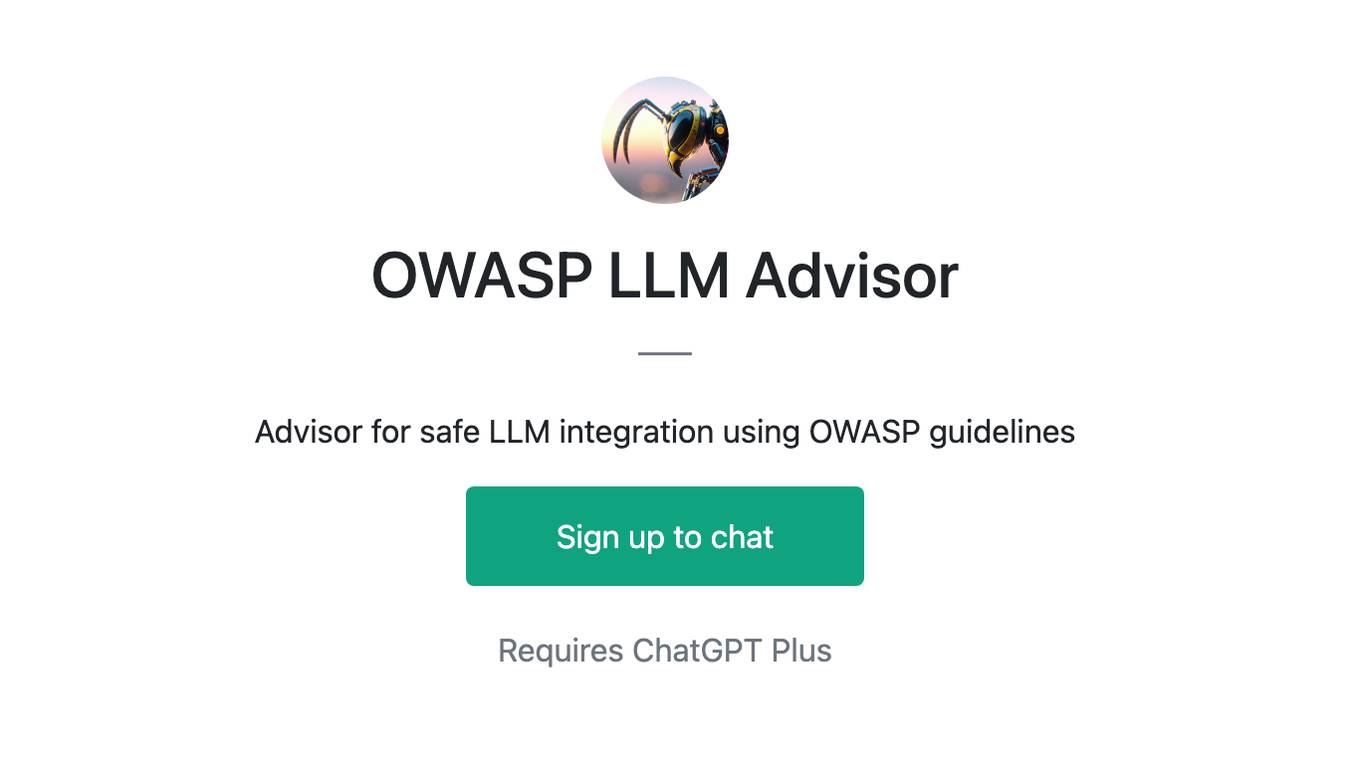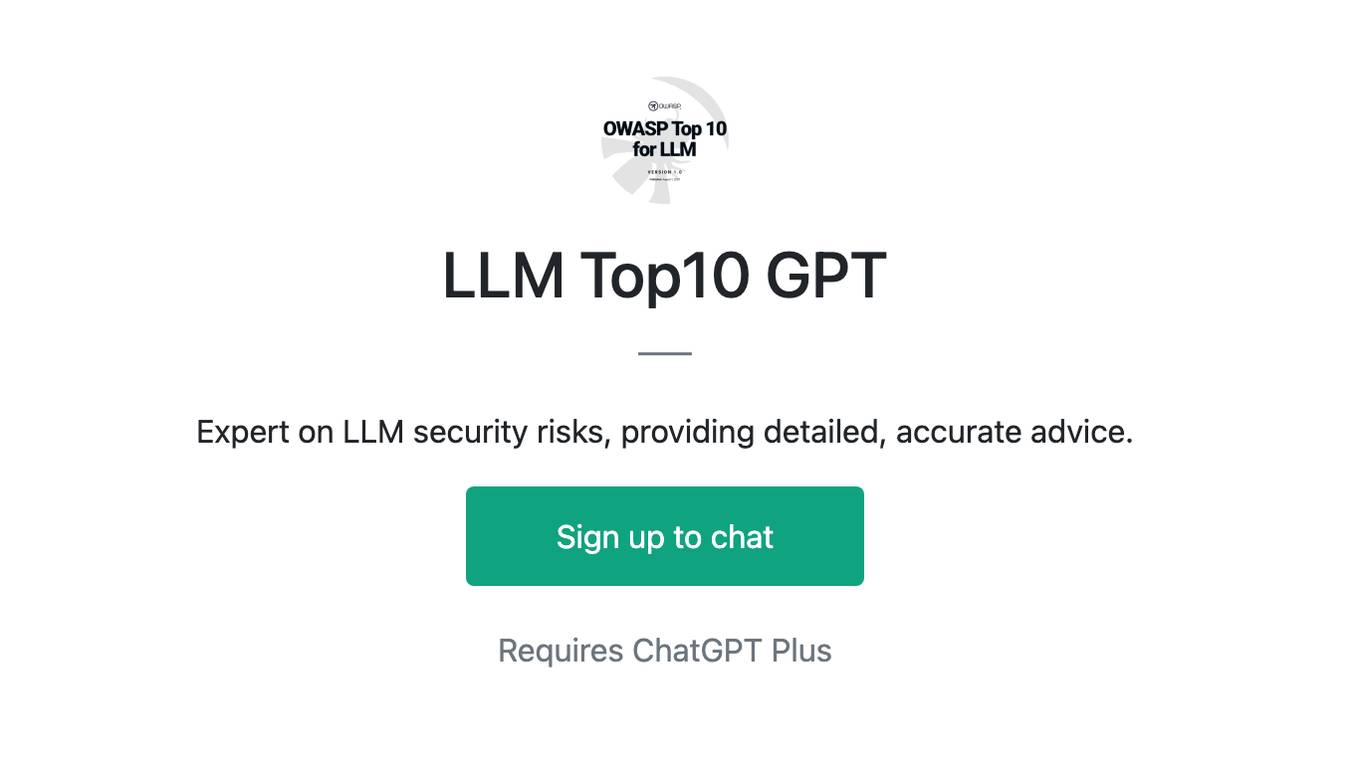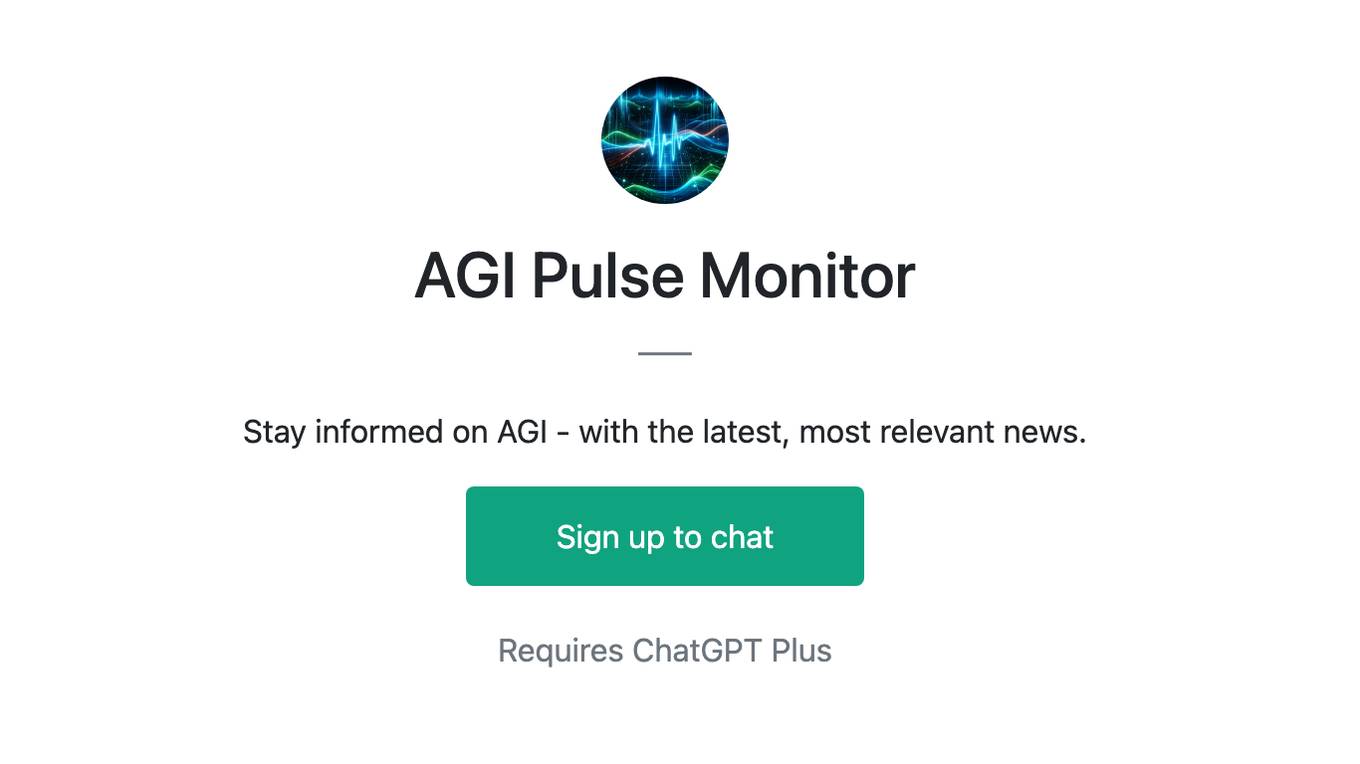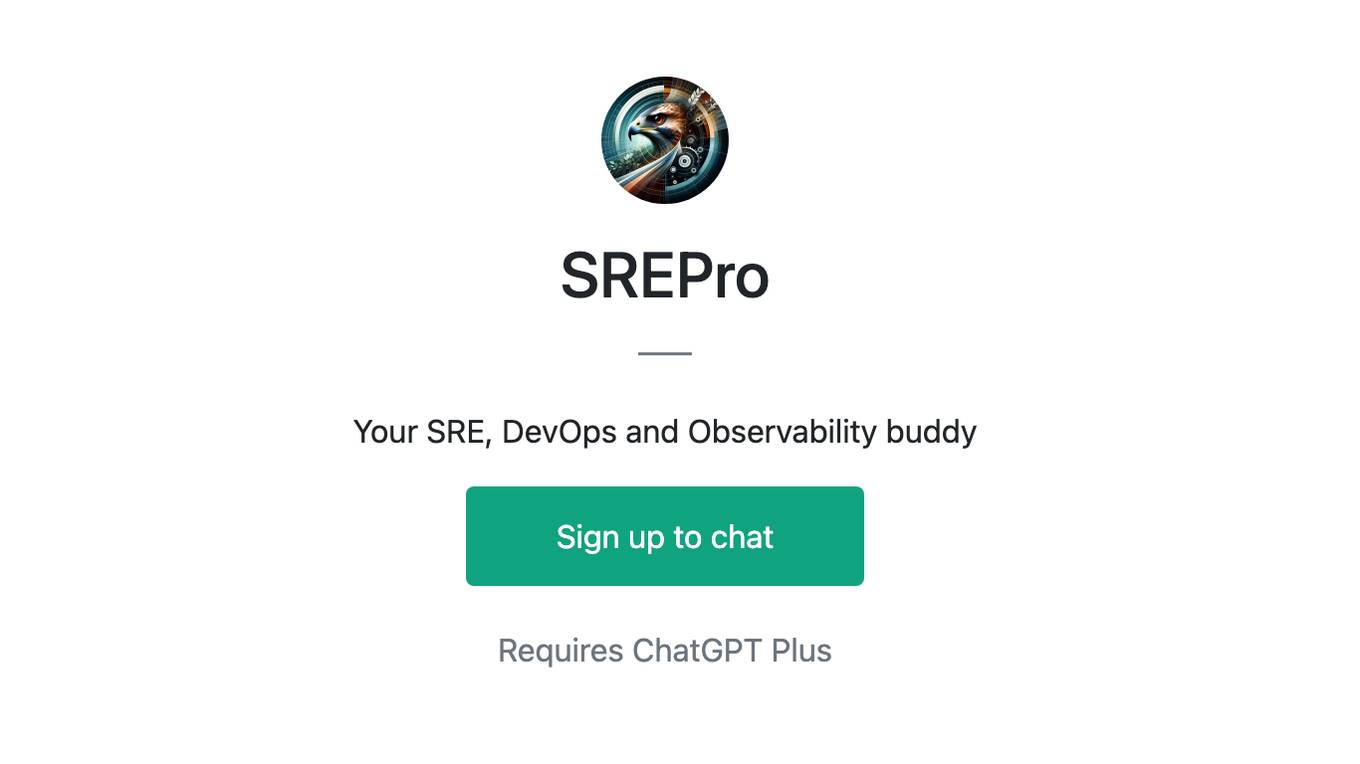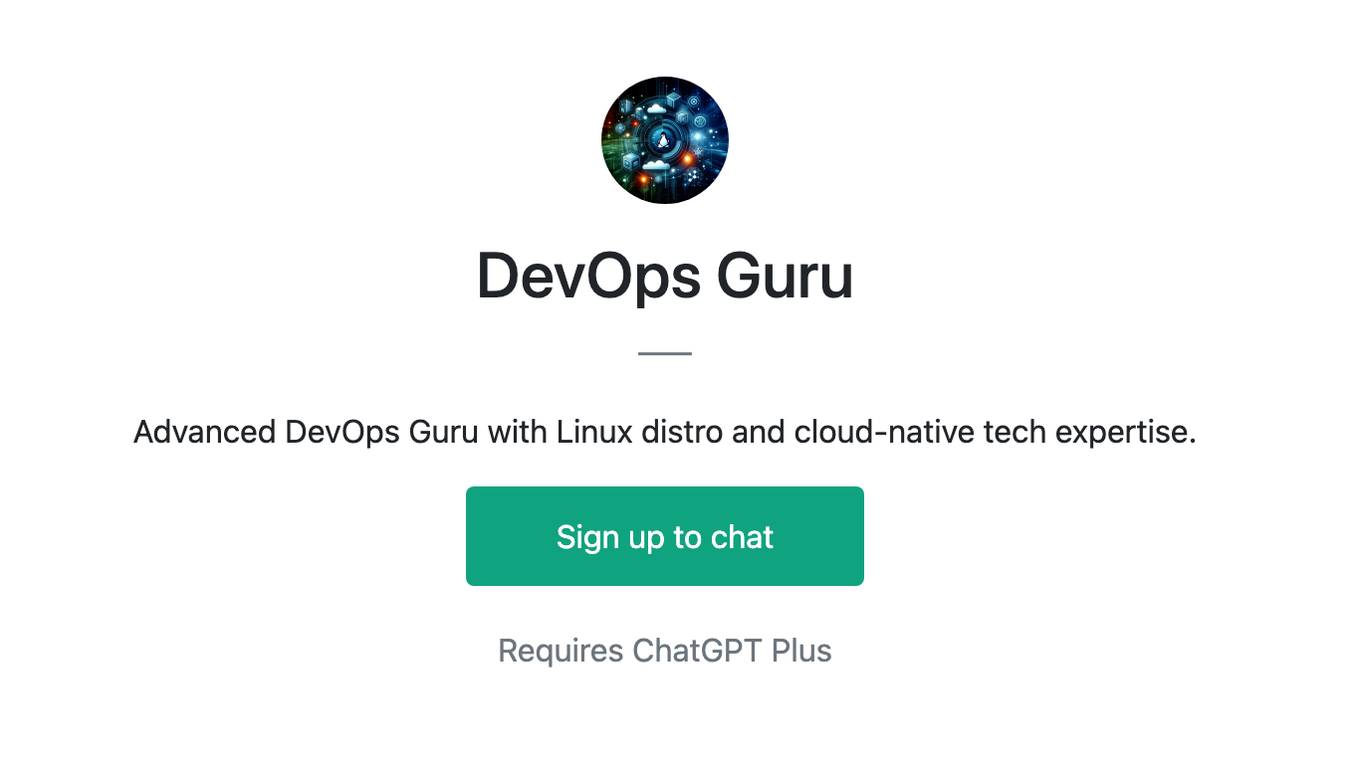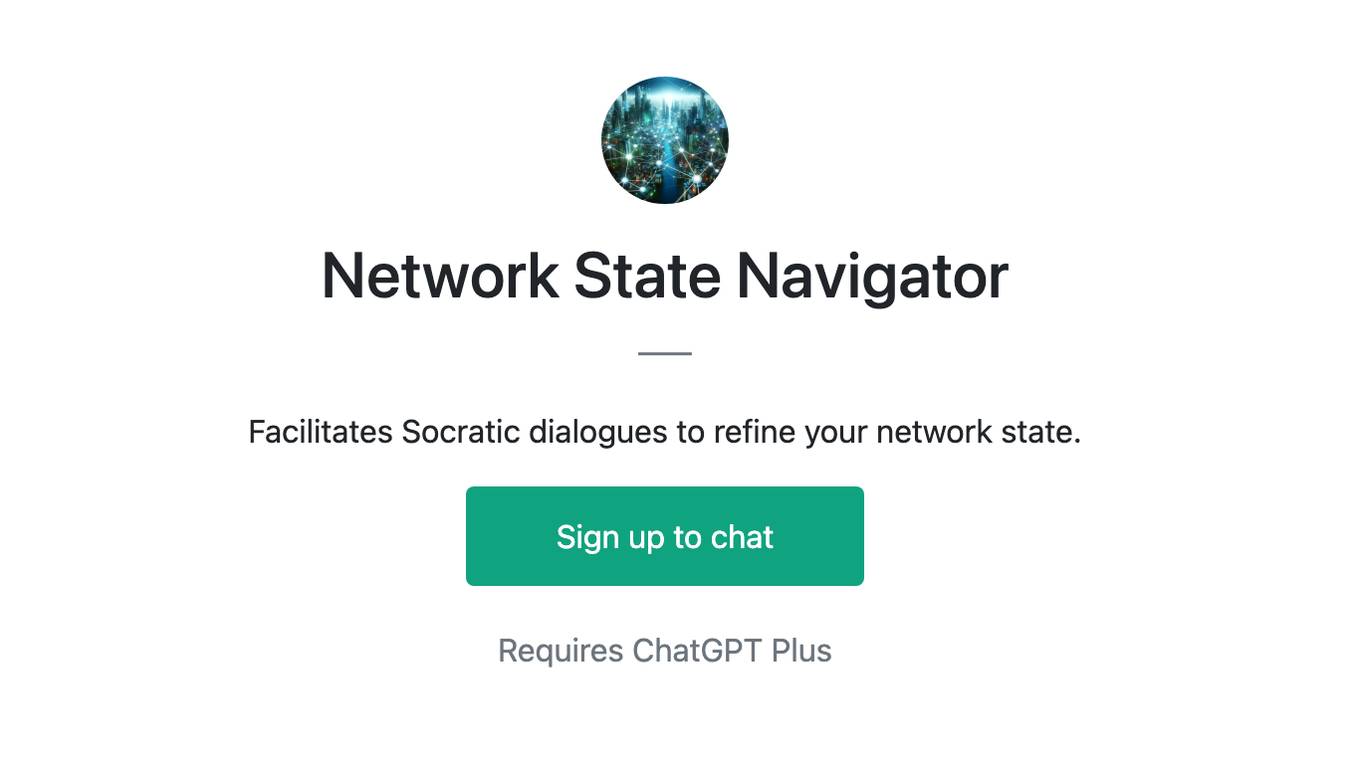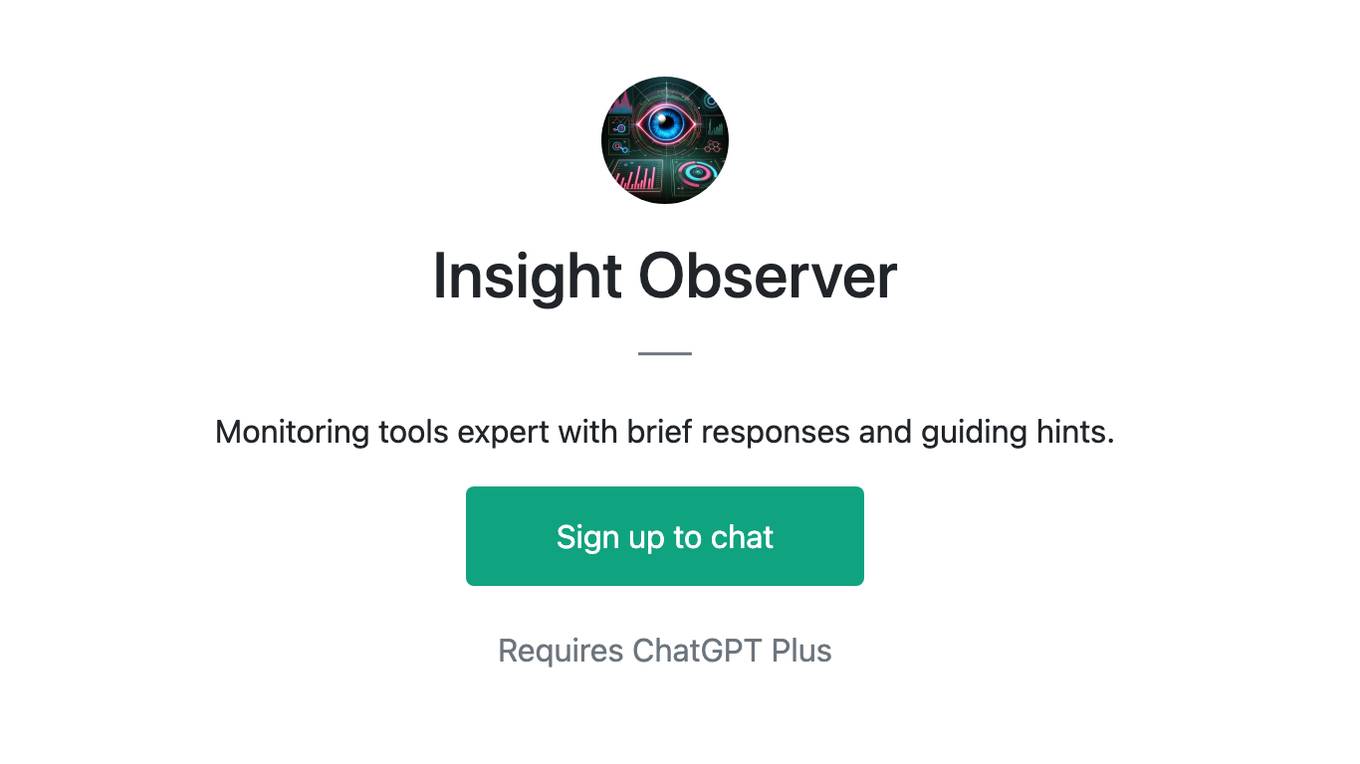Best AI tools for< Monitor Llm Workflows >
20 - AI tool Sites

Confident AI
Confident AI is an open-source evaluation infrastructure for Large Language Models (LLMs). It provides a centralized platform to judge LLM applications, ensuring substantial benefits and addressing any weaknesses in LLM implementation. With Confident AI, companies can define ground truths to ensure their LLM is behaving as expected, evaluate performance against expected outputs to pinpoint areas for iterations, and utilize advanced diff tracking to guide towards the optimal LLM stack. The platform offers comprehensive analytics to identify areas of focus and features such as A/B testing, evaluation, output classification, reporting dashboard, dataset generation, and detailed monitoring to help productionize LLMs with confidence.
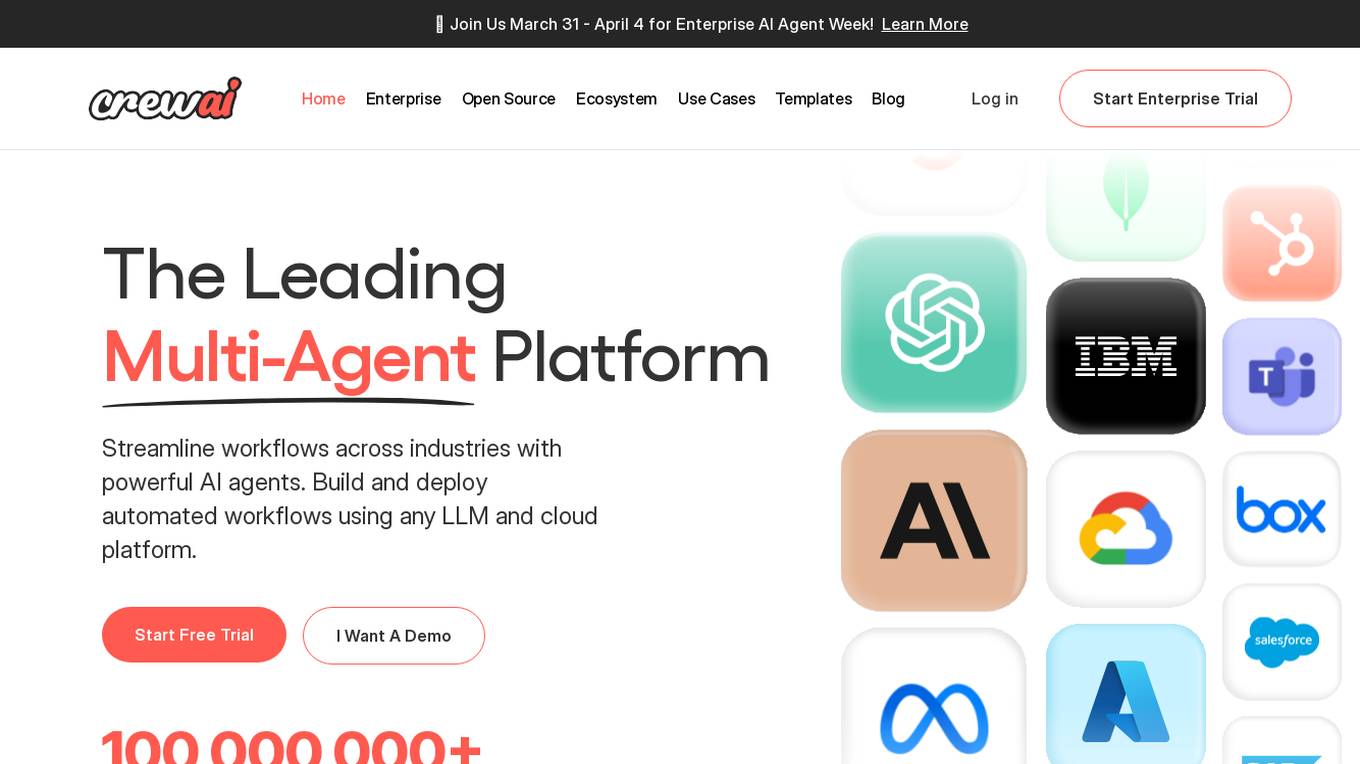
CrewAI
CrewAI is a leading multi-agent platform that enables users to streamline workflows across industries with powerful AI agents. Users can build and deploy automated workflows using any LLM and cloud platform. The platform offers tools for building, deploying, monitoring, and improving AI agents, providing complete visibility and control over automation processes. CrewAI is trusted by industry leaders and used in over 60 countries, offering a comprehensive solution for multi-agent automation.
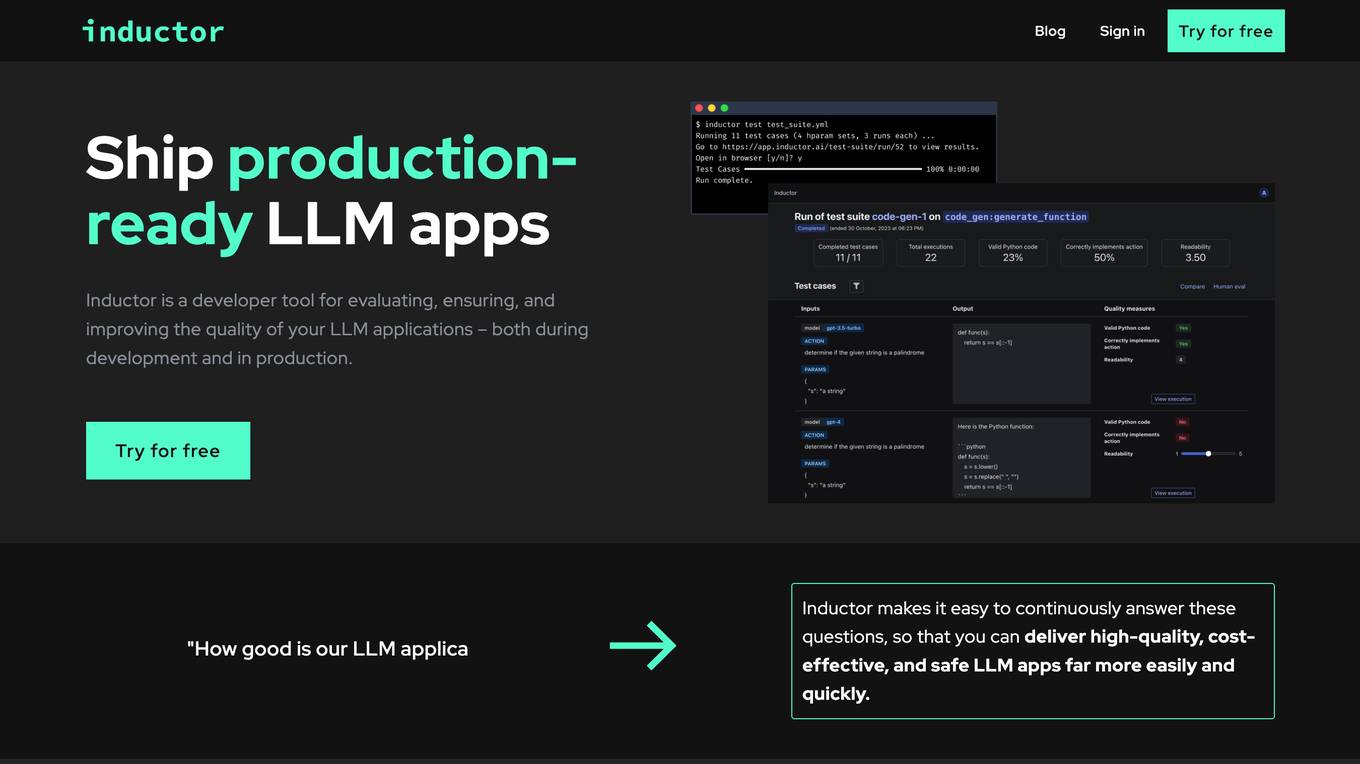
Inductor
Inductor is a developer tool for evaluating, ensuring, and improving the quality of your LLM applications – both during development and in production. It provides a fantastic workflow for continuous testing and evaluation as you develop, so that you always know your LLM app’s quality. Systematically improve quality and cost-effectiveness by actionably understanding your LLM app’s behavior and quickly testing different app variants. Rigorously assess your LLM app’s behavior before you deploy, in order to ensure quality and cost-effectiveness when you’re live. Easily monitor your live traffic: detect and resolve issues, analyze usage in order to improve, and seamlessly feed back into your development process. Inductor makes it easy for engineering and other roles to collaborate: get critical human feedback from non-engineering stakeholders (e.g., PM, UX, or subject matter experts) to ensure that your LLM app is user-ready.

Keywordly
Keywordly is an AI-powered SEO Content Workflow Platform designed to help users optimize, write, research, and monitor content for better rankings. It offers features such as AI-powered content creation, content research and planning, content optimization, and more. With Keywordly, users can generate high-quality content aligned with keyword clusters, identify high-value keywords, repurpose and optimize existing content, and boost brand visibility on search engines and platforms like Google and ChatGPT. The platform streamlines the content creation process by providing tools for keyword discovery, clustering, and content strategy planning, helping users drive organic traffic and improve their SEO efforts.
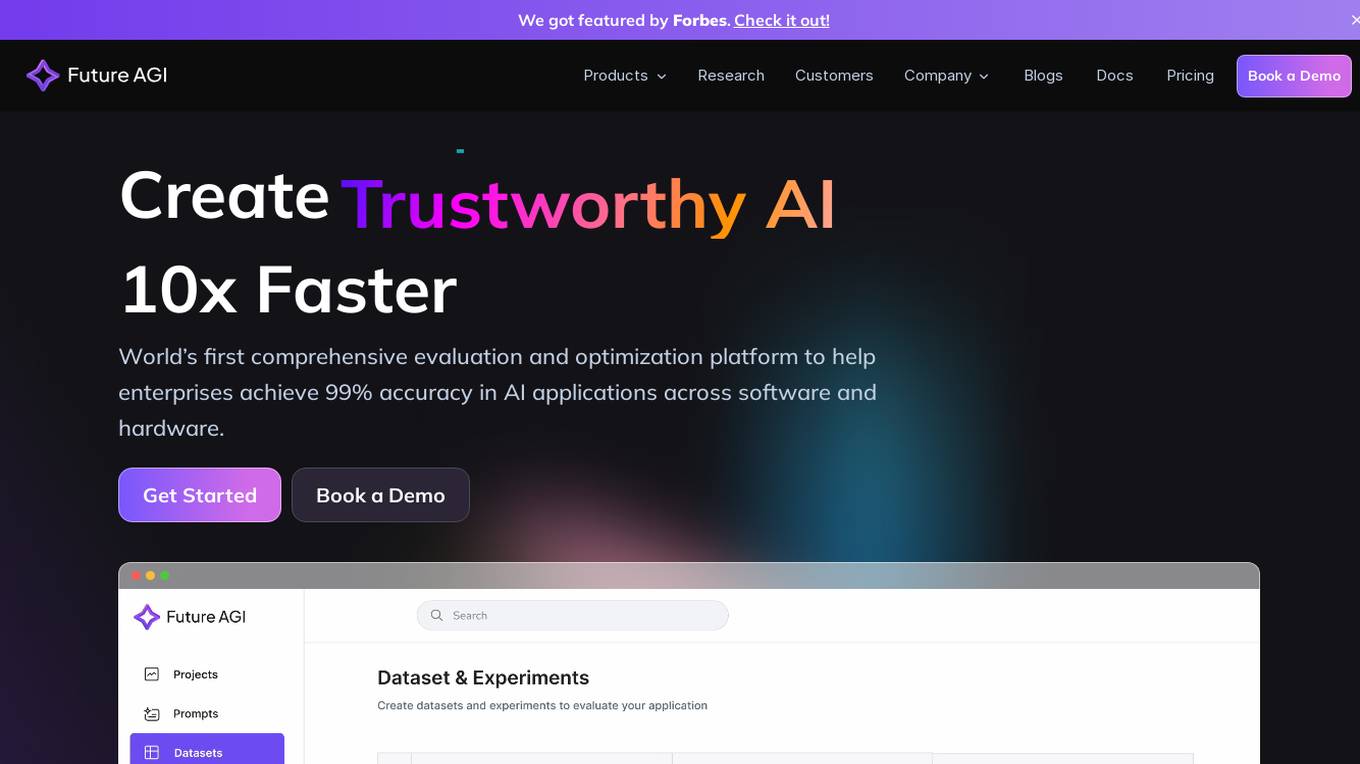
Future AGI
Future AGI is a revolutionary AI data management platform that aims to achieve 99% accuracy in AI applications across software and hardware. It provides a comprehensive evaluation and optimization platform for enterprises to enhance the performance of their AI models. Future AGI offers features such as creating trustworthy, accurate, and responsible AI, 10x faster processing, generating and managing diverse synthetic datasets, testing and analyzing agentic workflow configurations, assessing agent performance, enhancing LLM application performance, monitoring and protecting applications in production, and evaluating AI across different modalities.
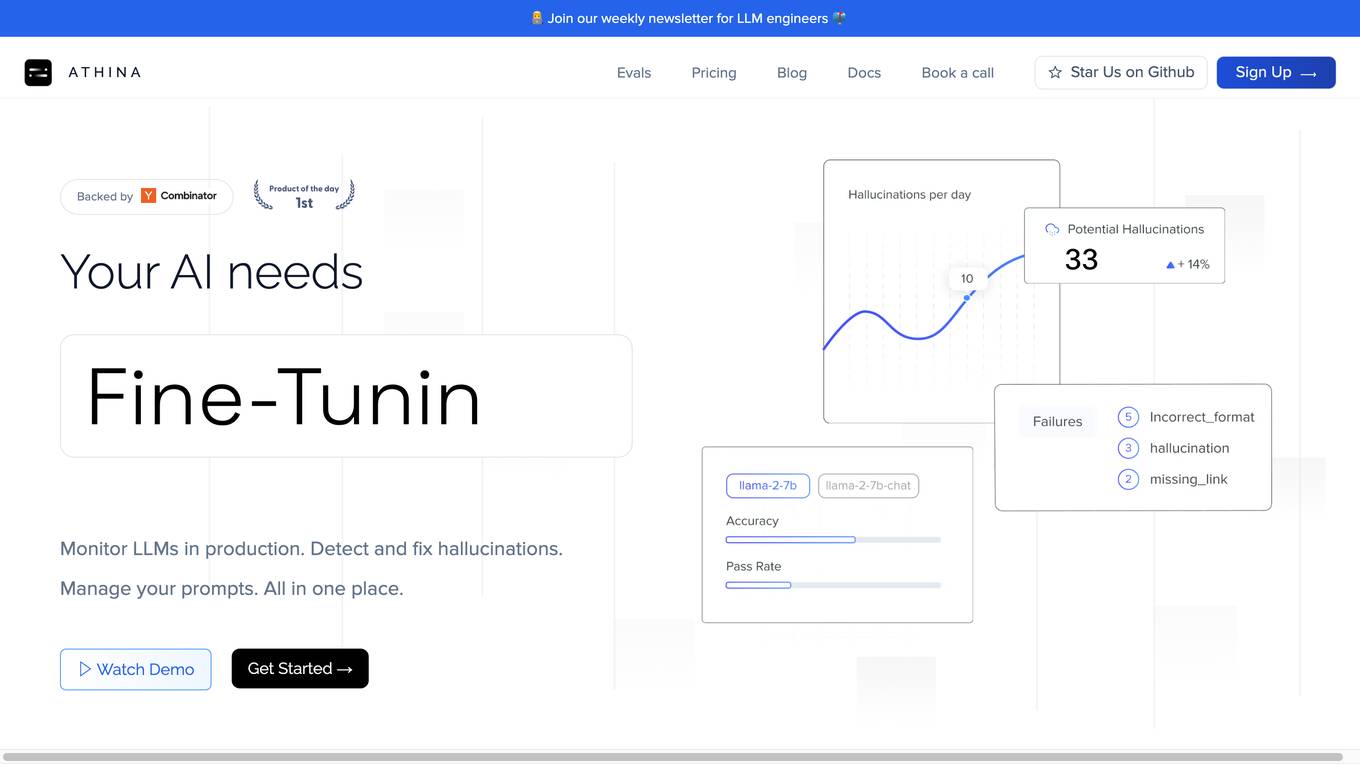
Athina AI
Athina AI is a comprehensive platform designed to monitor, debug, analyze, and improve the performance of Large Language Models (LLMs) in production environments. It provides a suite of tools and features that enable users to detect and fix hallucinations, evaluate output quality, analyze usage patterns, and optimize prompt management. Athina AI supports integration with various LLMs and offers a range of evaluation metrics, including context relevancy, harmfulness, summarization accuracy, and custom evaluations. It also provides a self-hosted solution for complete privacy and control, a GraphQL API for programmatic access to logs and evaluations, and support for multiple users and teams. Athina AI's mission is to empower organizations to harness the full potential of LLMs by ensuring their reliability, accuracy, and alignment with business objectives.

Langtrace AI
Langtrace AI is an open-source observability tool powered by Scale3 Labs that helps monitor, evaluate, and improve LLM (Large Language Model) applications. It collects and analyzes traces and metrics to provide insights into the ML pipeline, ensuring security through SOC 2 Type II certification. Langtrace supports popular LLMs, frameworks, and vector databases, offering end-to-end observability and the ability to build and deploy AI applications with confidence.

LLM Pulse
LLM Pulse is an AI search visibility tracker designed for the AI chatbot world. It provides real-time monitoring of your brand's presence across various AI search engines, allowing you to track key prompts, analyze citations, understand visibility scores, and dive into detailed responses. The platform offers insights effortlessly, suggesting relevant prompts, comparing your brand against competitors, and soon analyzing brand sentiment. With different pricing plans catering to individuals, growing businesses, large organizations, and enterprises, LLM Pulse aims to help users make strategic decisions in the age of AI.
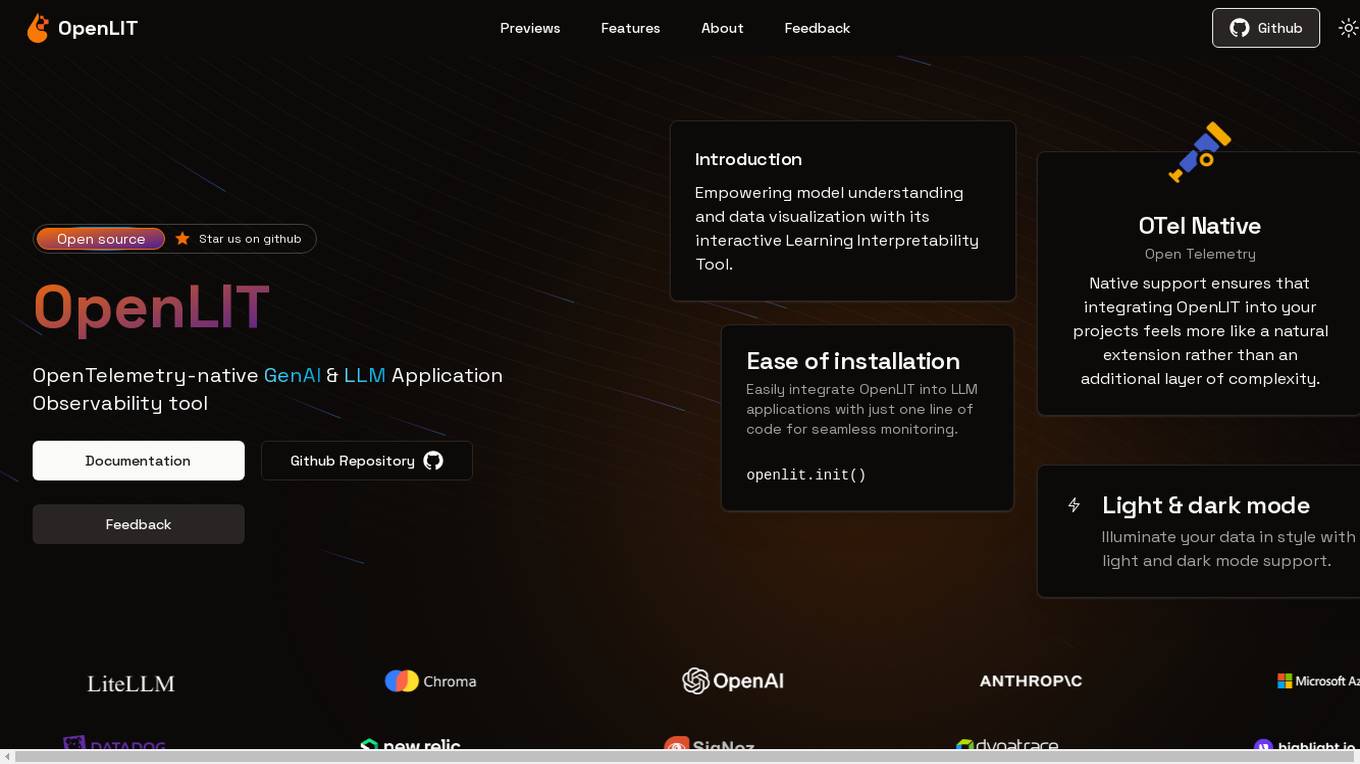
OpenLIT
OpenLIT is an AI application designed as an Observability tool for GenAI and LLM applications. It empowers model understanding and data visualization through an interactive Learning Interpretability Tool. With OpenTelemetry-native support, it seamlessly integrates into projects, offering features like fine-tuning performance, real-time data streaming, low latency processing, and visualizing data insights. The tool simplifies monitoring with easy installation and light/dark mode options, connecting to popular observability platforms for data export. Committed to OpenTelemetry community standards, OpenLIT provides valuable insights to enhance application performance and reliability.

Langtail
Langtail is a platform that helps developers build, test, and deploy AI-powered applications. It provides a suite of tools to help developers debug prompts, run tests, and monitor the performance of their AI models. Langtail also offers a community forum where developers can share tips and tricks, and get help from other users.
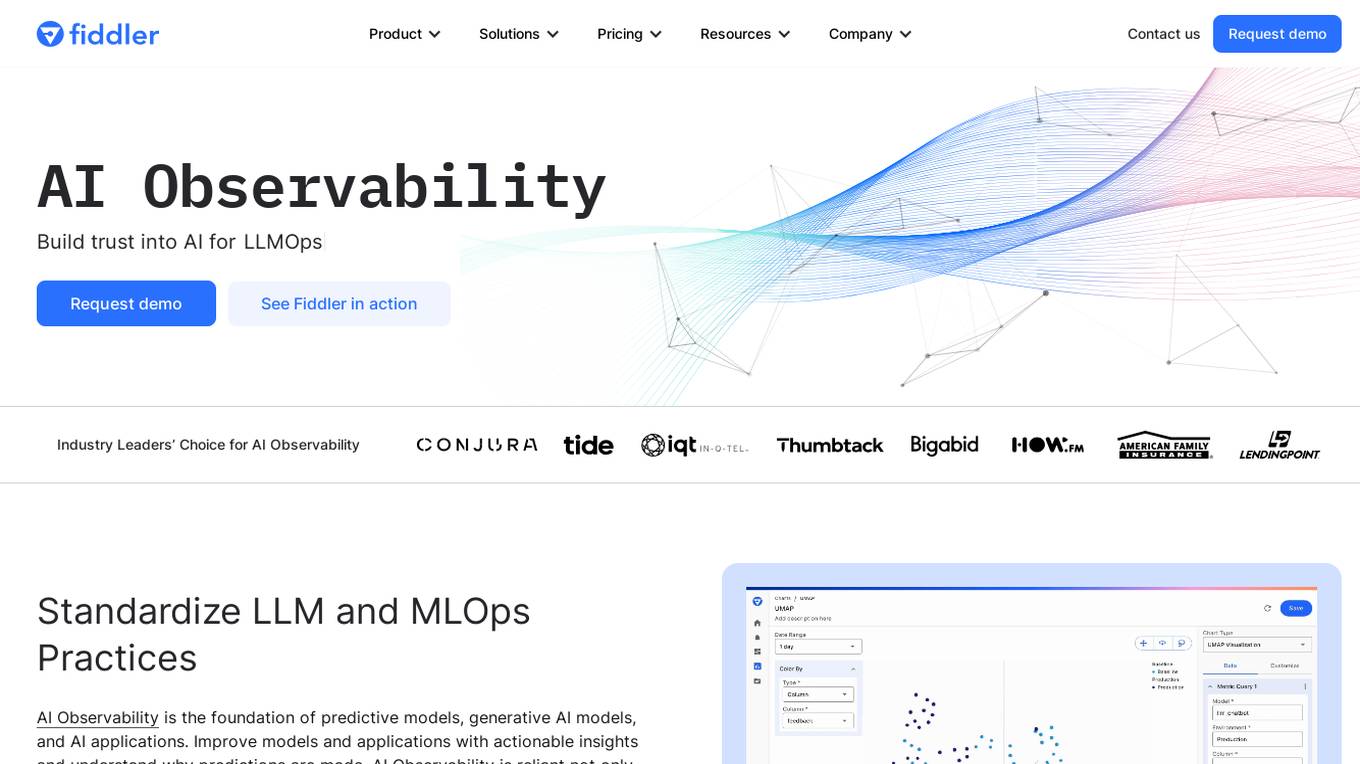
Fiddler AI
Fiddler AI is an AI Observability platform that provides tools for monitoring, explaining, and improving the performance of AI models. It offers a range of capabilities, including explainable AI, NLP and CV model monitoring, LLMOps, and security features. Fiddler AI helps businesses to build and deploy high-performing AI solutions at scale.
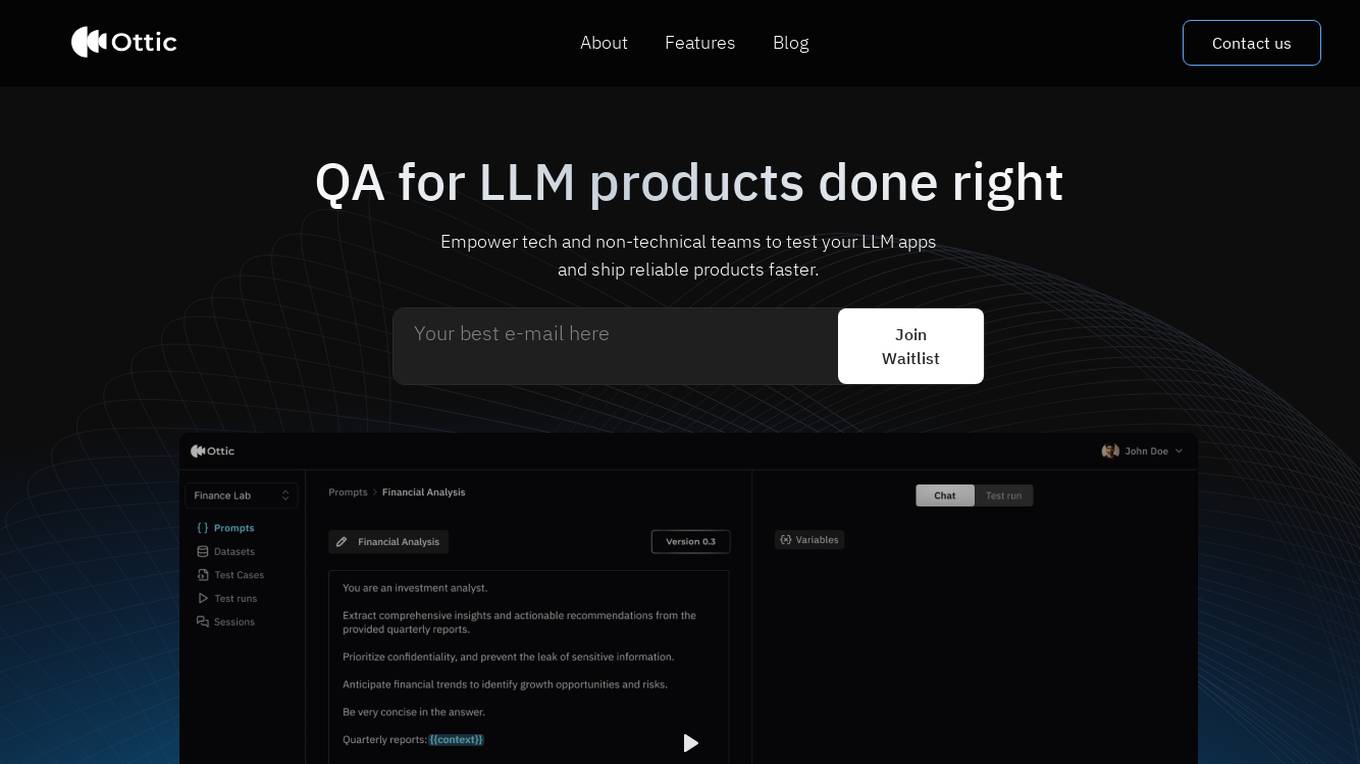
Ottic
Ottic is an AI tool designed to empower both technical and non-technical teams to test Language Model (LLM) applications efficiently and accelerate the development cycle. It offers features such as a 360º view of the QA process, end-to-end test management, comprehensive LLM evaluation, and real-time monitoring of user behavior. Ottic aims to bridge the gap between technical and non-technical team members, ensuring seamless collaboration and reliable product delivery.

Evidently AI
Evidently AI is an open-source machine learning (ML) monitoring and observability platform that helps data scientists and ML engineers evaluate, test, and monitor ML models from validation to production. It provides a centralized hub for ML in production, including data quality monitoring, data drift monitoring, ML model performance monitoring, and NLP and LLM monitoring. Evidently AI's features include customizable reports, structured checks for data and models, and a Python library for ML monitoring. It is designed to be easy to use, with a simple setup process and a user-friendly interface. Evidently AI is used by over 2,500 data scientists and ML engineers worldwide, and it has been featured in publications such as Forbes, VentureBeat, and TechCrunch.
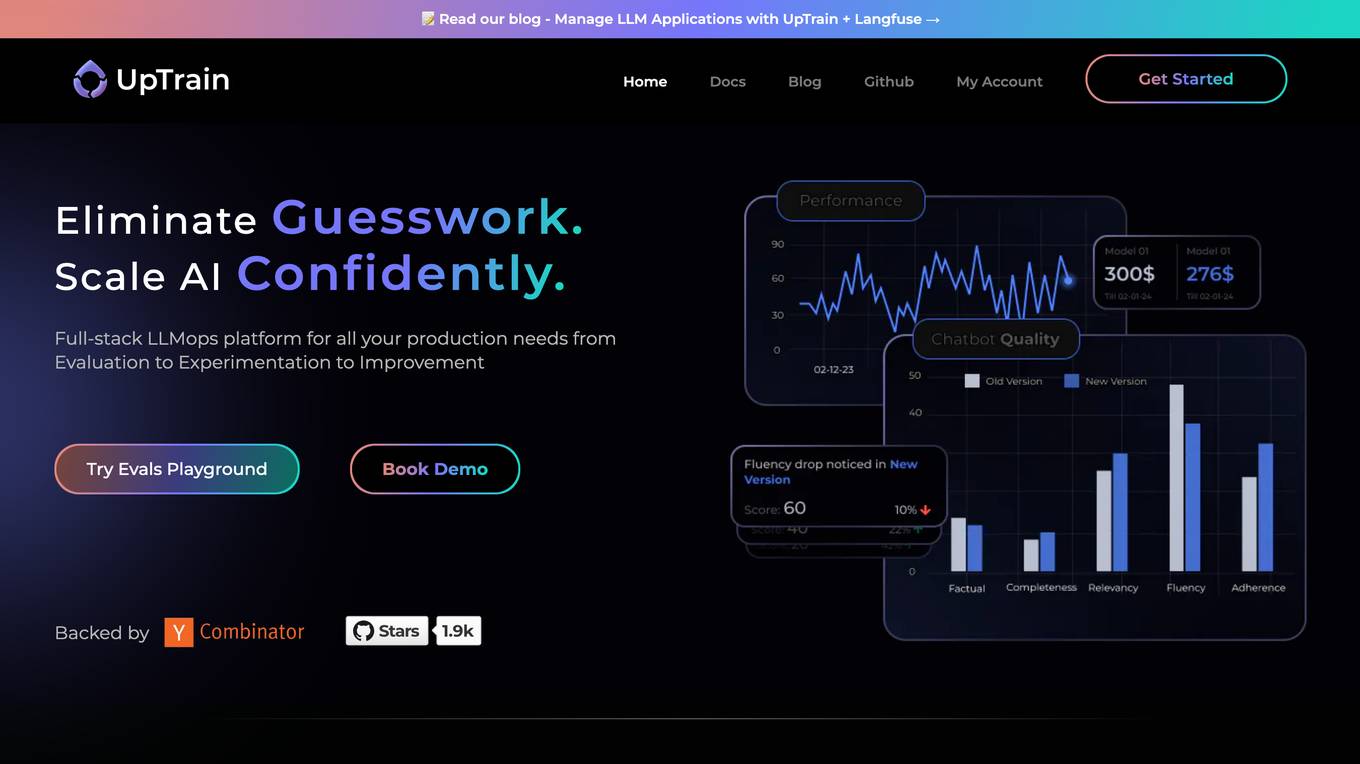
UpTrain
UpTrain is a full-stack LLMOps platform designed to help users confidently scale AI by providing a comprehensive solution for all production needs, from evaluation to experimentation to improvement. It offers diverse evaluations, automated regression testing, enriched datasets, and innovative techniques to generate high-quality scores. UpTrain is built for developers, compliant to data governance needs, cost-efficient, remarkably reliable, and open-source. It provides precision metrics, task understanding, safeguard systems, and covers a wide range of language features and quality aspects. The platform is suitable for developers, product managers, and business leaders looking to enhance their LLM applications.
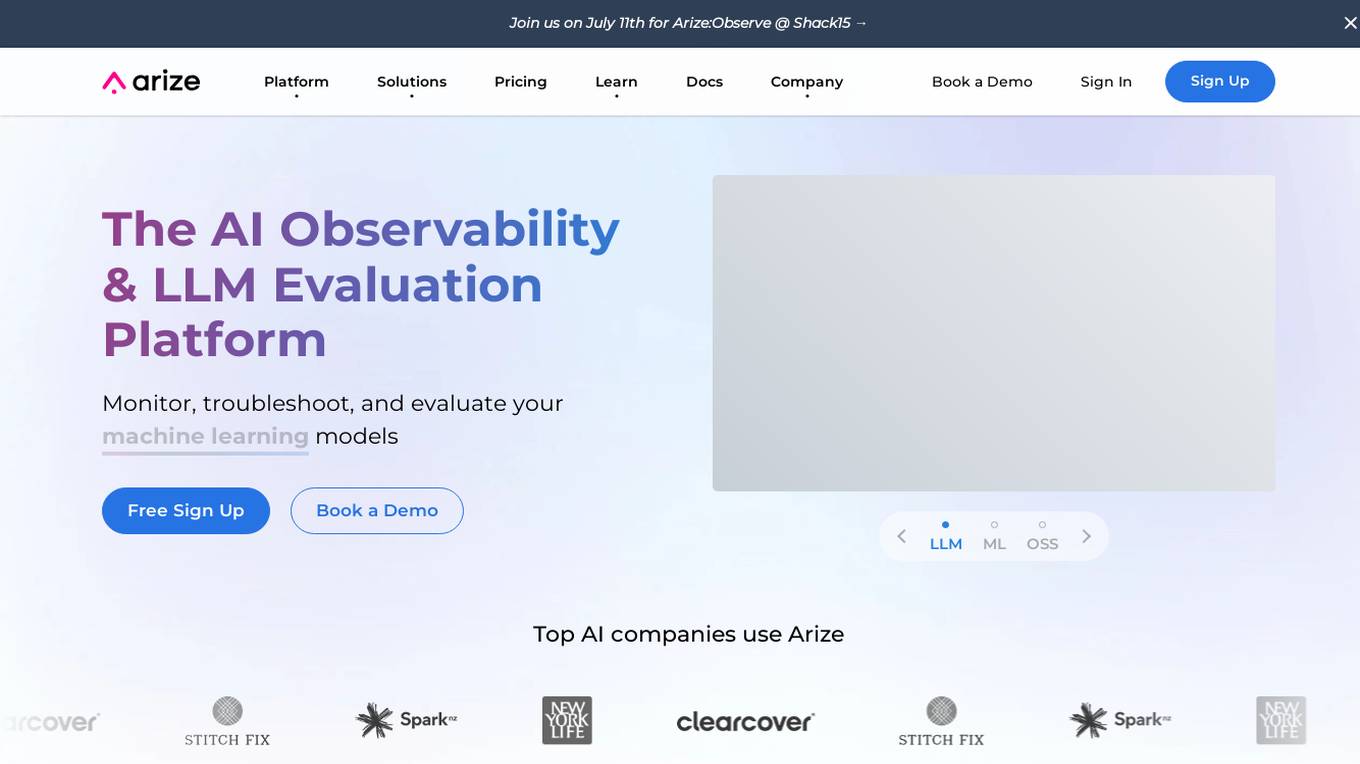
Arize AI
Arize AI is an AI Observability & LLM Evaluation Platform that helps you monitor, troubleshoot, and evaluate your machine learning models. With Arize, you can catch model issues, troubleshoot root causes, and continuously improve performance. Arize is used by top AI companies to surface, resolve, and improve their models.
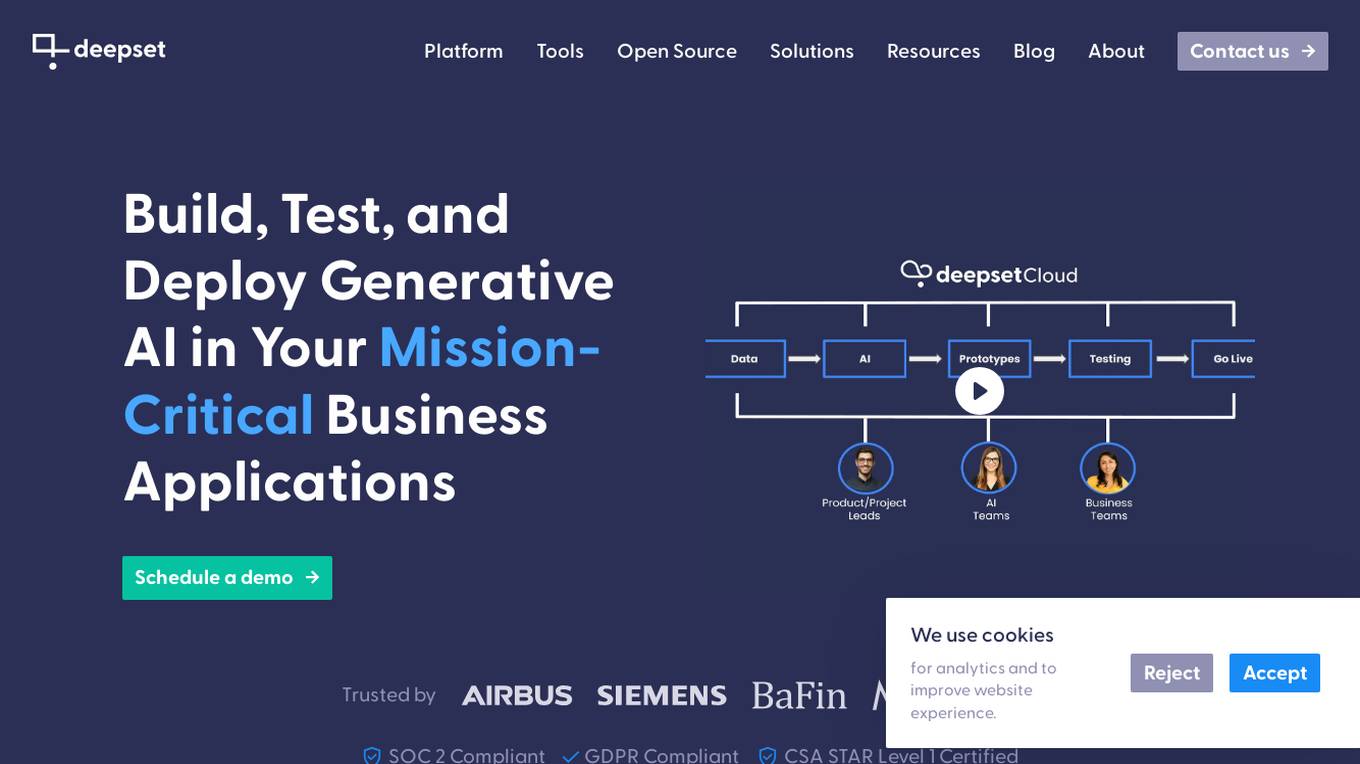
deepset
deepset is an AI platform that offers enterprise-level products and solutions for AI teams. It provides deepset Cloud, a platform built with Haystack, enabling fast and accurate prototyping, building, and launching of advanced AI applications. The platform streamlines the AI application development lifecycle, offering processes, tools, and expertise to move from prototype to production efficiently. With deepset Cloud, users can optimize solution accuracy, performance, and cost, and deploy AI applications at any scale with one click. The platform also allows users to explore new models and configurations without limits, extending their team with access to world-class AI engineers for guidance and support.
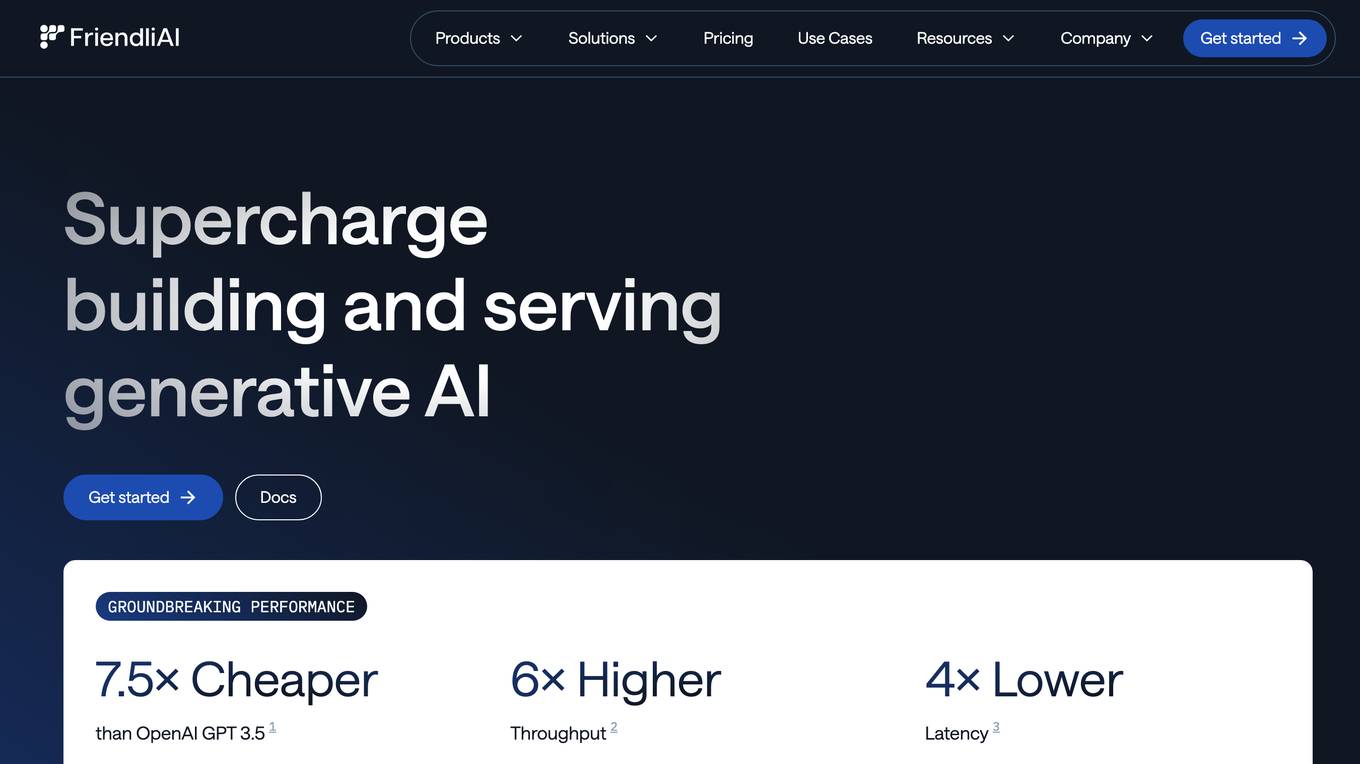
FriendliAI
FriendliAI is a generative AI infrastructure company that offers efficient, fast, and reliable generative AI inference solutions for production. Their cutting-edge technologies enable groundbreaking performance improvements, cost savings, and lower latency. FriendliAI provides a platform for building and serving compound AI systems, deploying custom models effortlessly, and monitoring and debugging model performance. The application guarantees consistent results regardless of the model used and offers seamless data integration for real-time knowledge enhancement. With a focus on security, scalability, and performance optimization, FriendliAI empowers businesses to scale with ease.

AthenaHQ
AthenaHQ is a cutting-edge Generative Engine Optimization (GEO) Explore Platform that leverages AI technology to help brands track and measure their performance on GenAI search. It offers features such as prompt volume tracking, brand monitoring, action center for brand protection, case studies, and pricing options. AthenaHQ is designed to empower marketing teams by providing actionable insights and strategies to improve brand visibility and perception in the AI-driven search landscape.
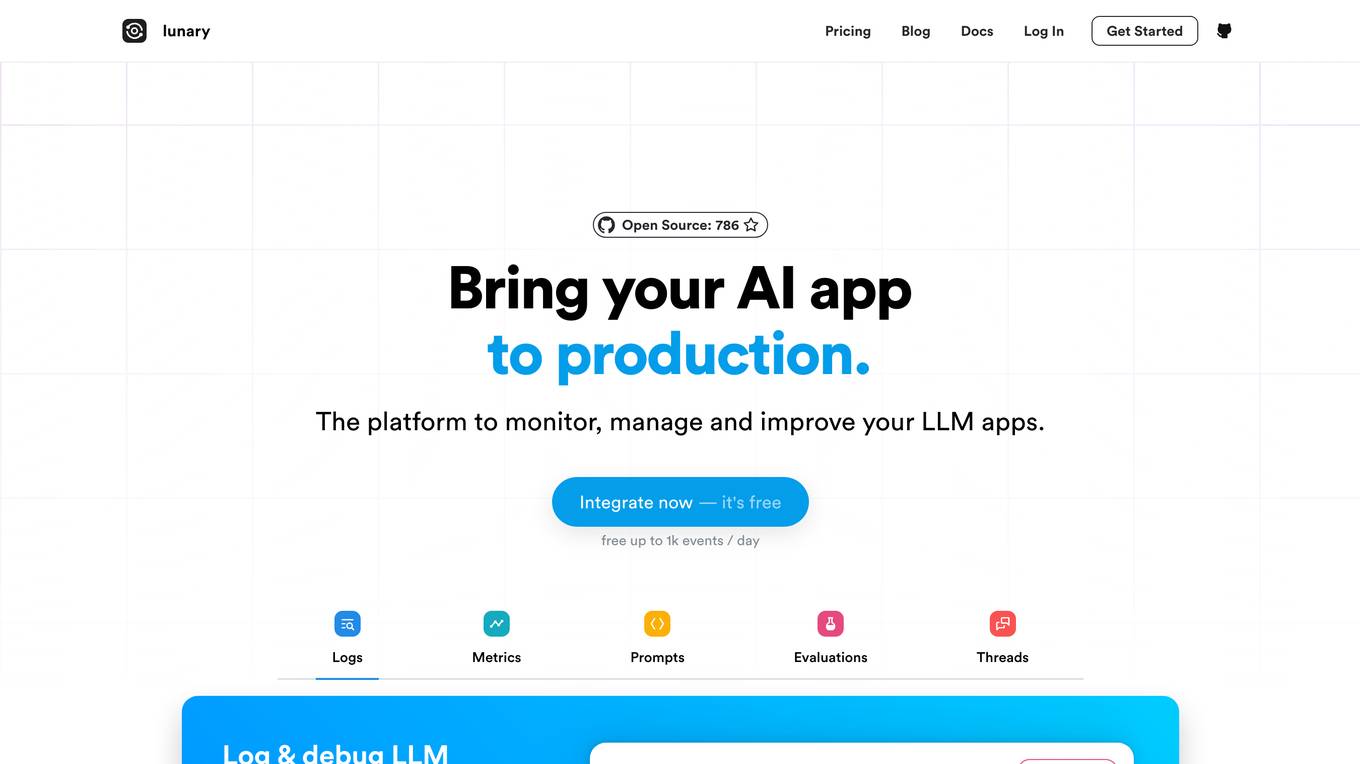
Lunary
Lunary is an AI developer platform designed to bring AI applications to production. It offers a comprehensive set of tools to manage, improve, and protect LLM apps. With features like Logs, Metrics, Prompts, Evaluations, and Threads, Lunary empowers users to monitor and optimize their AI agents effectively. The platform supports tasks such as tracing errors, labeling data for fine-tuning, optimizing costs, running benchmarks, and testing open-source models. Lunary also facilitates collaboration with non-technical teammates through features like A/B testing, versioning, and clean source-code management.
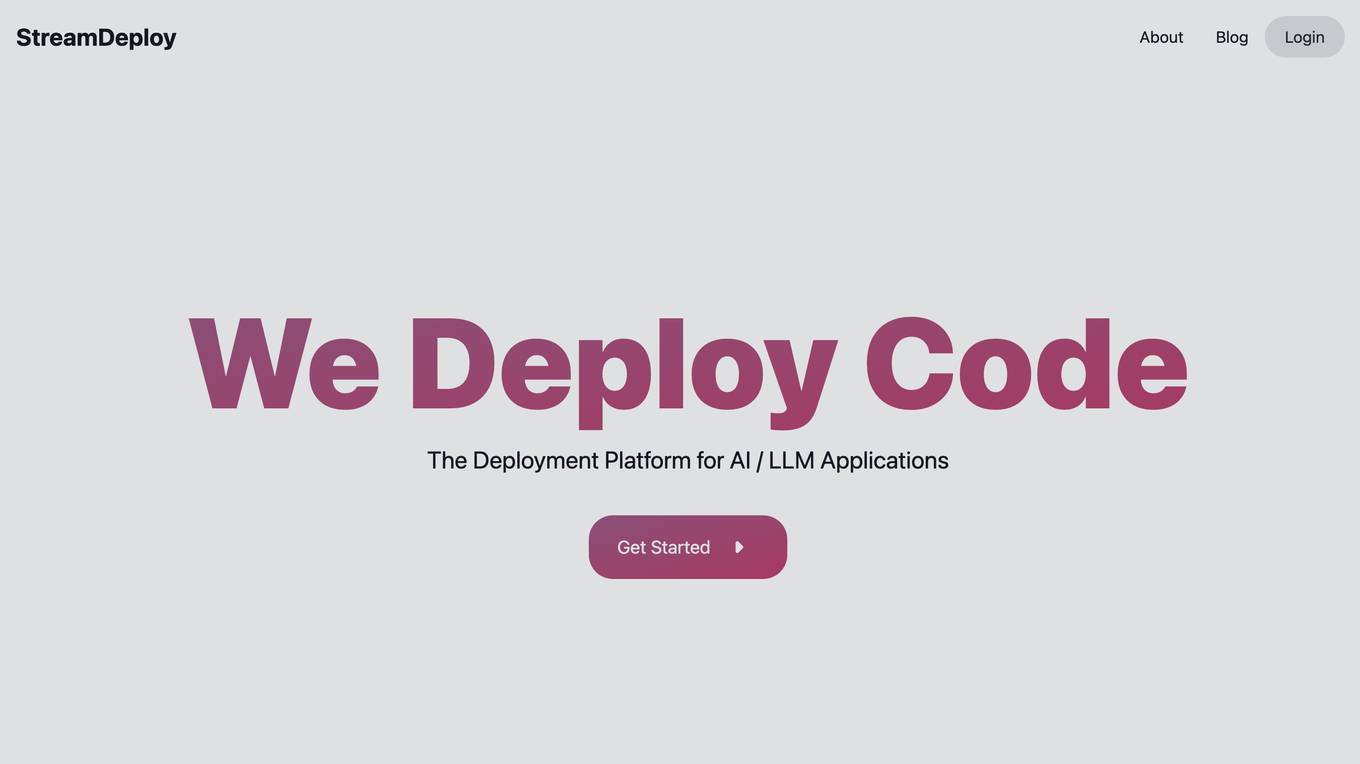
StreamDeploy
StreamDeploy is an AI-powered cloud deployment platform designed to streamline and secure application deployment for agile teams. It offers a range of features to help developers maximize productivity and minimize costs, including a Dockerfile generator, automated security checks, and support for continuous integration and delivery (CI/CD) pipelines. StreamDeploy is currently in closed beta, but interested users can book a demo or follow the company on Twitter for updates.
0 - Open Source AI Tools
20 - OpenAI Gpts

Quake and Volcano Watch Iceland
Seismic and volcanic monitor with in-depth data and visuals.
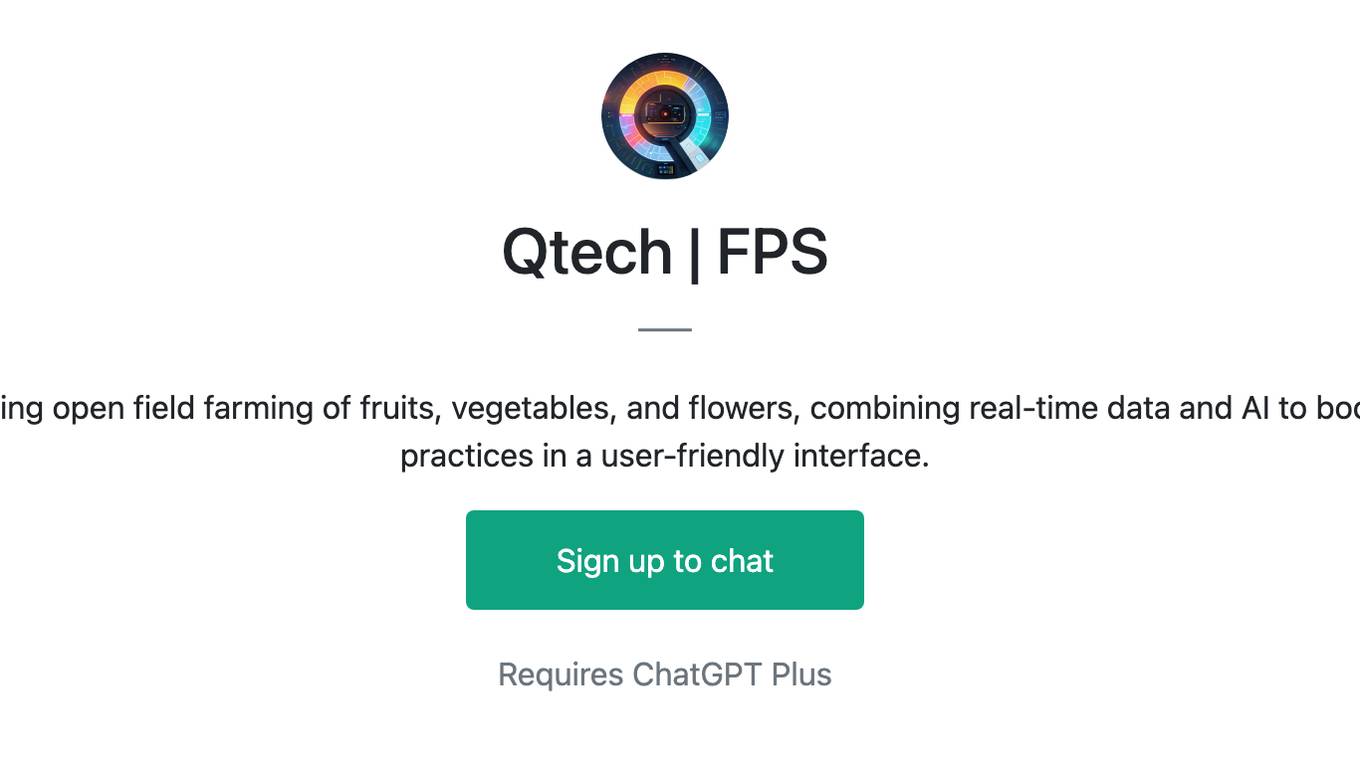
Qtech | FPS
Frost Protection System is an AI bot optimizing open field farming of fruits, vegetables, and flowers, combining real-time data and AI to boost yield, cut costs, and foster sustainable practices in a user-friendly interface.
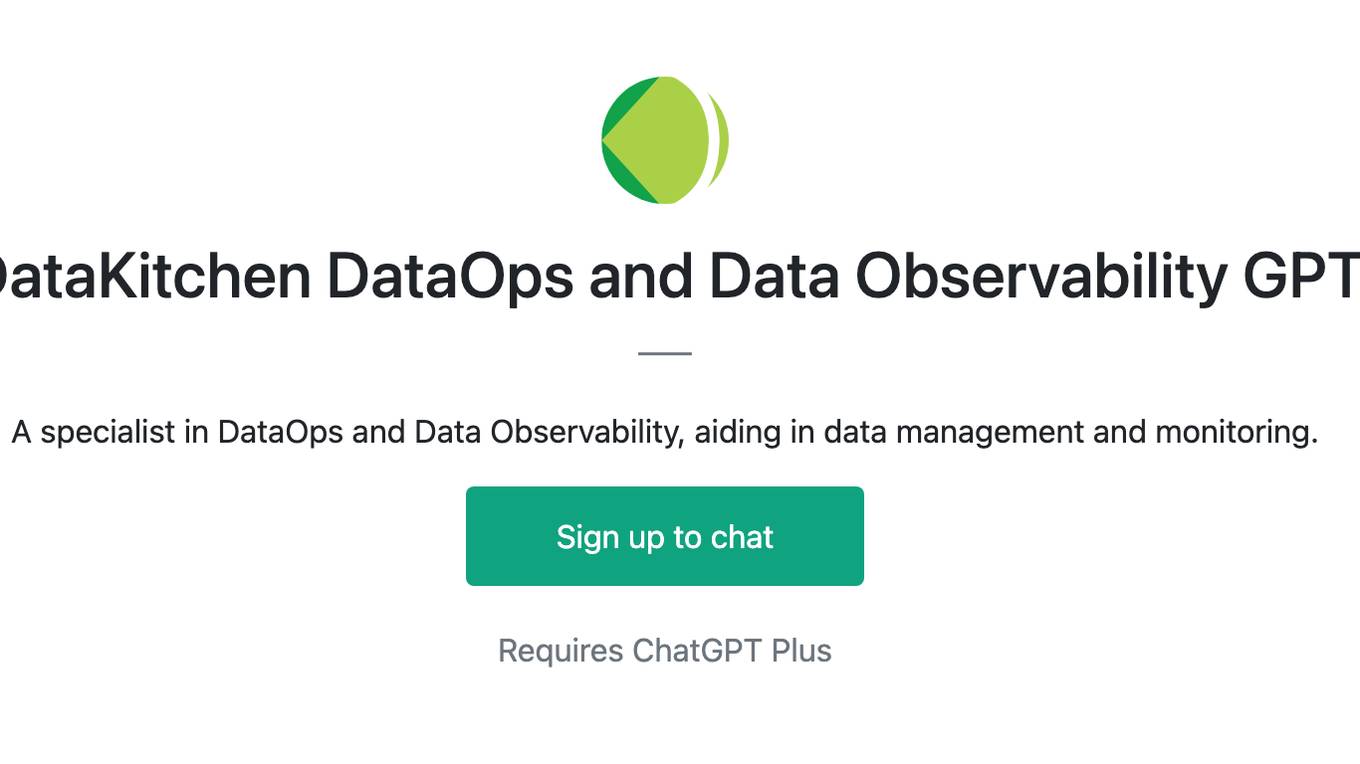
DataKitchen DataOps and Data Observability GPT
A specialist in DataOps and Data Observability, aiding in data management and monitoring.

Financial Cybersecurity Analyst - Lockley Cash v1
stunspot's advisor for all things Financial Cybersec

AML/CFT Expert
Specializes in Anti-Money Laundering/Counter-Financing of Terrorism compliance and analysis.
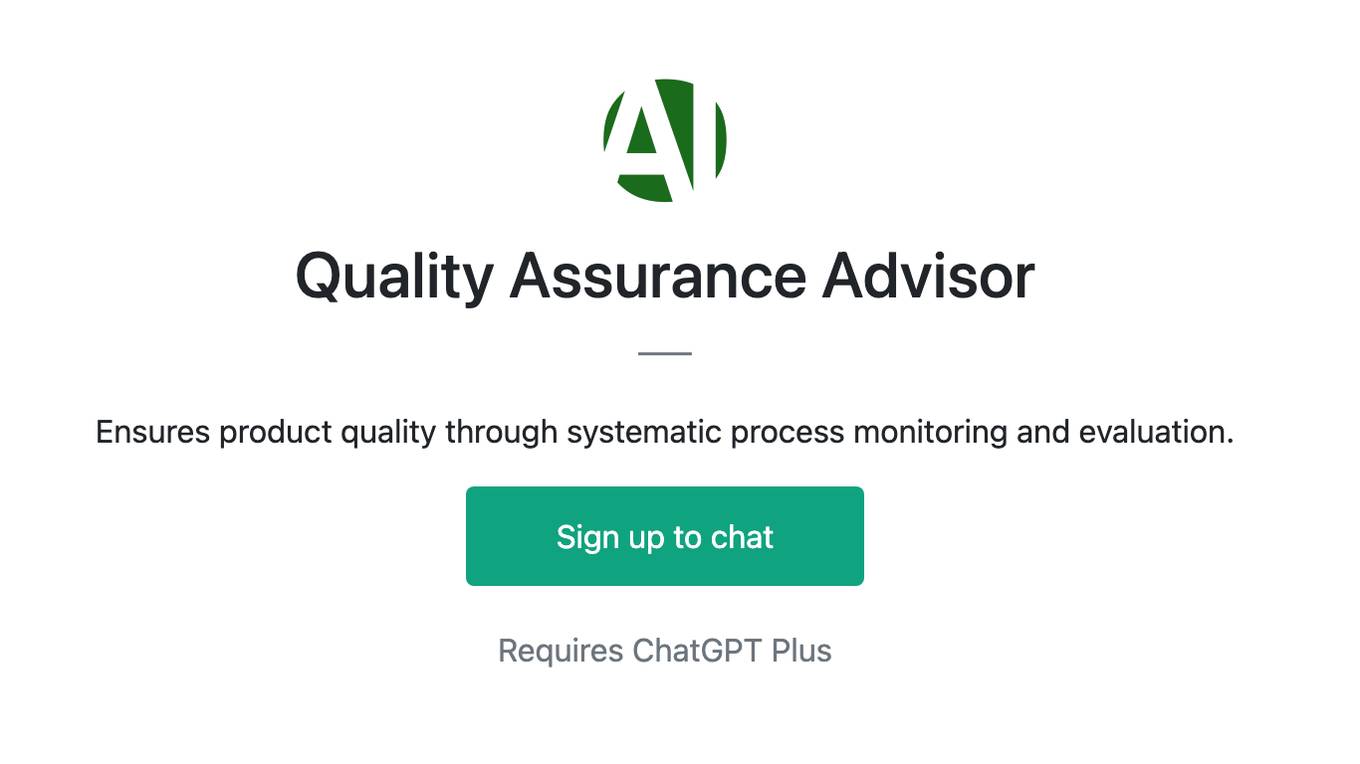
Quality Assurance Advisor
Ensures product quality through systematic process monitoring and evaluation.
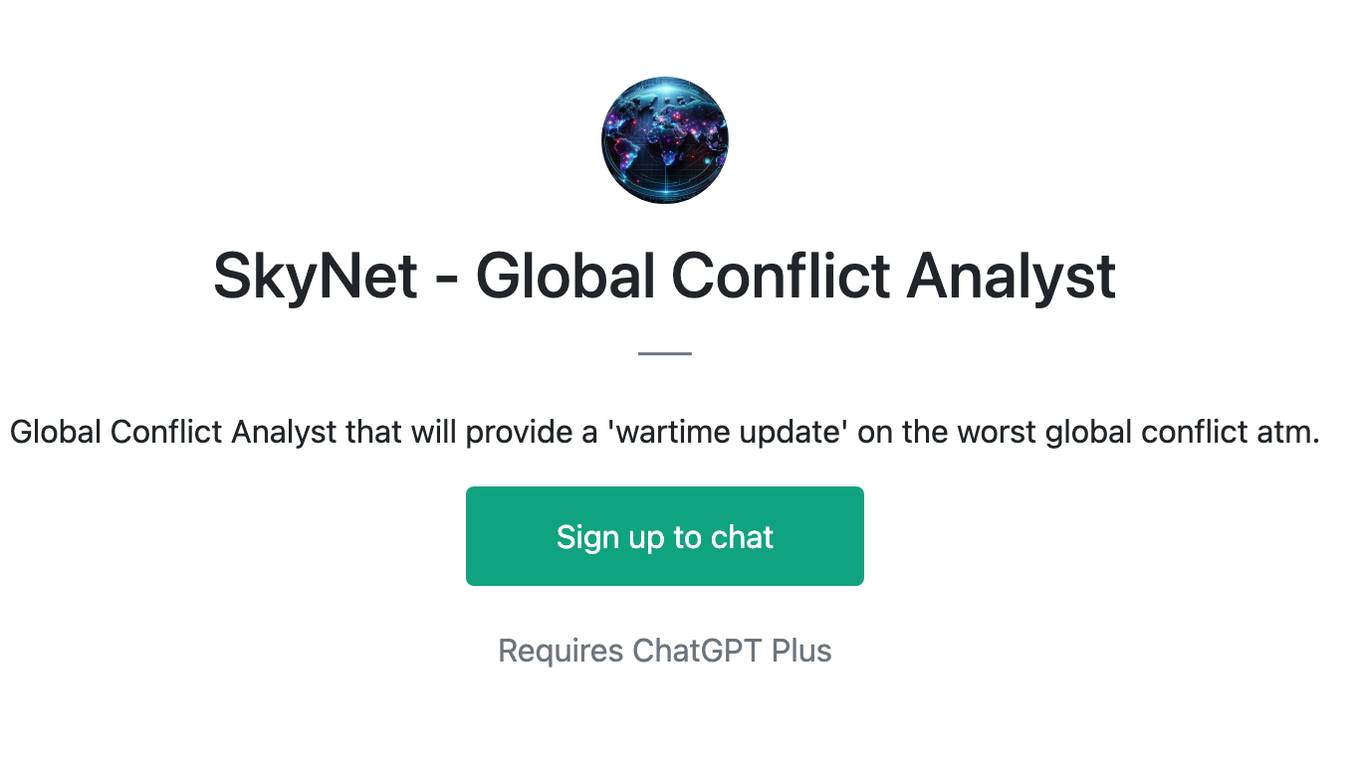
SkyNet - Global Conflict Analyst
Global Conflict Analyst that will provide a 'wartime update' on the worst global conflict atm.
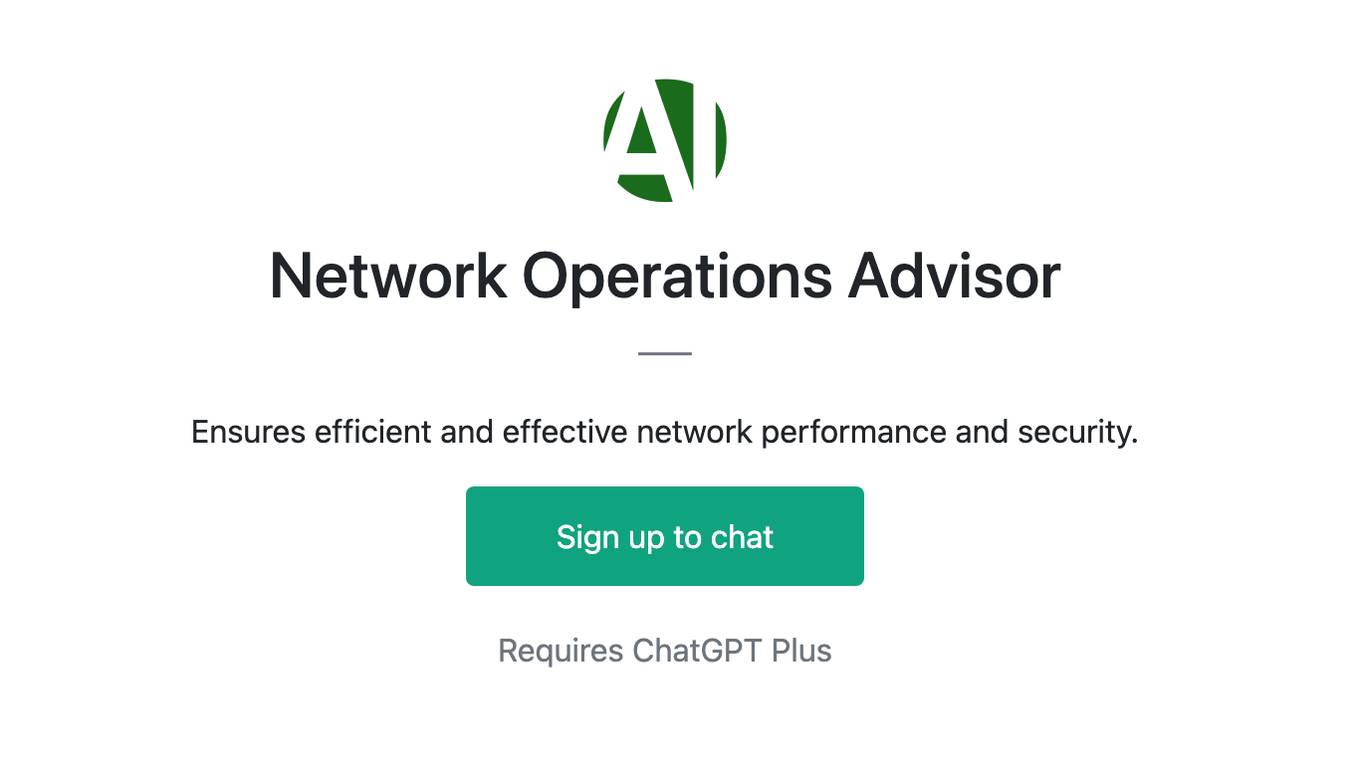
Network Operations Advisor
Ensures efficient and effective network performance and security.
